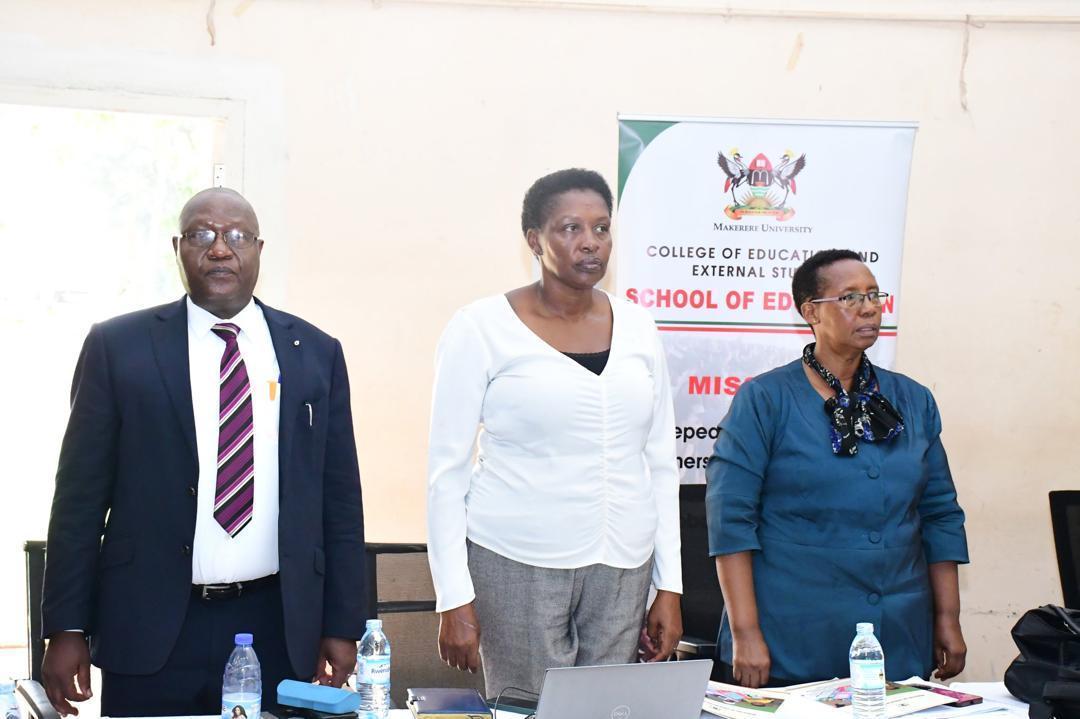Africa-Press – Uganda. Makerere University, in collaboration with the Ministry of Education and Sports (MoES) has hosted a high-level Early Childhood Care and Education (ECCE) Policy Awareness Workshop on Friday, drawing over 250 stakeholders from across Uganda’s education sector.
Attendees included policymakers, teacher educators, school proprietors, and representatives from training institutions, all focused on strengthening the training, professional development, and regulation of the country’s early childhood education workforce.
Opening the workshop, the Principal of Makerere University College of Education and External Studies (CEES), Anthony Mugagga, emphasized the vital role early childhood education (ECE) plays in national development.
“Early childhood education is key in Uganda; it is part of us,” he stated, reaffirming Makerere University’s commitment to supporting the sector through training, capacity-building initiatives, and innovative programs.
Mugagga highlighted the growing demand for ECE training, which has surpassed expectations. While the College initially targeted diploma holders for its new Bachelor of Early Childhood Education program, a significant number of applicants held only Advanced Level qualifications.
The first intake for the bachelor’s program attracted 500 applicants, with only 110 admitted, while the second saw 1,000 applicants, with 120 admitted. Similarly, the Master’s program received 100 applications, admitting just 10 students.
“To meet this growing demand, Makerere University is seeking funding to establish a dedicated ECE center and expand staffing to accommodate more educators,” Mugagga said.
He also announced plans to introduce a taught PhD in Early Childhood Care and Education next academic year, complementing the current research-based program.
The Acting Commissioner for the Teacher Education and Training Department (TETD) at MoES, Annet Mugisha Kajura, underscored the foundational role of teacher training in ensuring quality education. Using the metaphor of a forest and its young trees, she explained that an education system cannot thrive without well-trained and motivated teachers.
She outlined the workshop’s objectives: strengthening partnerships between the Ministry, training institutions, and stakeholders; improving coordination for better teacher training outcomes; raising awareness of ECE standards and policies; identifying gaps in professional development; and developing strategies for accreditation, certification, and online registration of pre-primary teachers. Kajura stressed that teacher training institutions must prioritize quality over profit, follow approved training frameworks, and uphold ethical and professional standards.
The Deputy Director at the Makerere Institute of Teacher Education and Research (MITER) David Kabugo presented a paper titled Repositioning Early Childhood Education Teacher Training and Development in Uganda, highlighting gaps between policy and practice. He noted fragmented governance, low educator qualifications, and limited human resource capacity.
“Uganda has few professors and associate professors specializing in ECE, with limited numbers of PhDs and Master’s holders, creating a ‘triangular distribution’ of expertise that undermines teacher preparation quality,” Kabugo said. He emphasized the need for structured career pathways, statutory enforcement, and human resource investment to professionalize ECE sustainably.
The Principal Education Officer for ECD Teacher Education and Training at MoES Elizabeth Kisakye Nsamba highlighted the importance of regulatory compliance, stressing that no institution should offer teacher training without government approval. She outlined key requirements, including adequate infrastructure, demonstration schools, digital readiness, qualified staff, and adherence to health and safety standards.
“We are in a transitional period toward full implementation of the National Teacher Bill and the establishment of the National Teacher Council. Public-private partnerships are critical to ensuring compliance and quality,” she said.
Fatuma Isabirye, a TMIS Consultant at MoES, demonstrated the online Teacher Management and Information System (TMIS) for pre-primary teacher registration, stressing the need for institutions to submit authentic graduation lists and academic credentials to ensure transparency and prevent fraud.
Muwonge Vincent of Makerere University’s Institute of Teacher Education and Research called for stronger collaboration between universities and training institutions to enhance teacher education through professional development, research, and innovation. “Mentorship, competency-based assessments, and inclusive capacity-building initiatives are essential to ensure no teacher educator is left behind,” he said.
Closing the workshop, Assistant Commissioner in charge of Pre-Primary Education at MoES, Safina Mutumba, emphasized the central role of teachers in implementing curricula and policies. She highlighted government plans to expand nursery education in primary schools and stressed the need for a well-prepared workforce.
“Teachers should embrace professional development opportunities and remain adaptable to new policies and emerging demands in the education sector,” she said.
The workshop concluded with a unified commitment to improving the quality of early childhood education in Uganda. Key outcomes include urgent investment in infrastructure, expanded staffing, enhanced professional development, and full regulatory compliance across all ECE institutions, ensuring that Uganda’s youngest learners benefit from high-quality education.
For More News And Analysis About Uganda Follow Africa-Press






